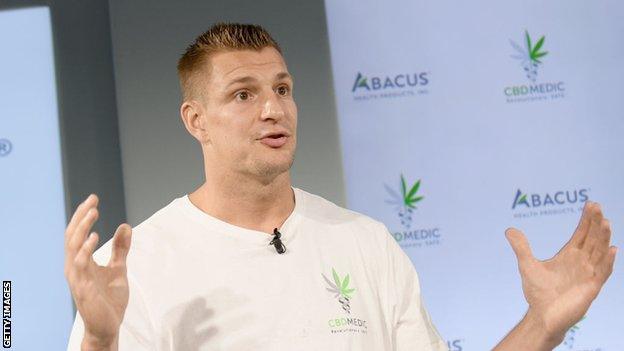Rob Gronkowski: Former New England Patriots tight end calls on NFL to legalise use of cannabis oil
- Published

Rob Gronkowski held an impromptu press conference to announce his partnership with CBDMedic
Former New England Patriots tight end Rob Gronkowski has called on sports' governing bodies to allow the use of cannabis oil in injury recovery.
The 30-year-old, who announced his retirement in March, has formed a partnership with CBDMedic, who produce cannabidiol (CBD) products.
CBD is banned in the NFL but Gronkowski says he is "pain-free" for the first time in a decade through its use.
"I was hurt both mentally and physically from football," he said.
"For the first time in more than a decade, I am pain-free."
On CBDMedic's website, three-time Super Bowl champion Gronkowski says using CBD during his career would have made a "huge difference".
In May, former defensive end Chris Long - who played for the St Louis Rams, the Patriots and Philadelphia Eagles - admitted using marijuana for pain management while he was an NFL player.
Speaking at a press conference, Gronkowski said: "I decided to walk away from the game for one main reason: I had to recover.
"That's why you haven't seen me in five months. I've been rebuilding myself and finding a new way."
He added: "I'm here to appeal to the sports governing bodies to update their positions on CBD [so it can be used by all players], whether that's the NBA, MLB or NFL. It's just time."
In 2018, running back Mike James asked the NFL for permission to use cannabis in the treatment of his chronic pain - submitting a therapeutic use exemption (TUE) for the drug - but had his request rejected.
The use of CBD is widespread in English rugby, with Saracens' George Kruis and Dominic Day taking cannabis oils, capsules and balms which they have said help "put our bodies back together".
Cannabis is an illegal class B drug in the UK but CBD on its own is legal.
CBD briefly explained
It is the tetrahydrocannabinol (THC) in cannabis that gets people high and has been linked to an increased risk of mental health issues and
But another component is cannabidiol (CDB) - which the World Health Organization (WHO) and does not appear to have abuse potential.
The World Anti-Doping Authority (Wada) removed CBD from its banned list in January 2018.